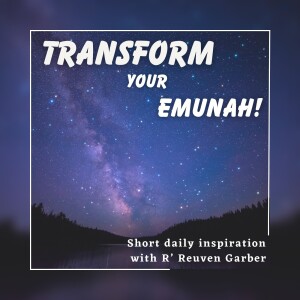
Thursday Apr 10, 2025
309 - Pesach (Part-1)
We are so privileged to have the opportunity to celebrate Pesach every single year. What exactly are we celebrating? Simply speaking, we're celebrating the fact that we were redeemed from the slavery in Egypt. It is worthwhile learning about what the Jewish people went through and experienced to appreciate what we're celebrating. It's important to highlight that our slavery in Egypt is not a fairy tale that didn't really transpire, God forbid. Just like we can relate to the Holocaust and similar atrocities throughout history, in the same way our enslavement in Egypt was something real that was experienced on a very real level by the Jewish people.
To just give one example of one of the atrocious things amongst many others: We know that the Jewish people were tricked into working for Pharaoh and they were given a certain quota of what they had to complete on a given day. If they had to collect material in order to make bricks to build a wall and they were short just of one brick of their expected quota, which was almost impossible - it was so much, they were forced to bring their own little cute precious child and stuff the child into the wall, thereby killing them, thereafter applying cement on top of the child. So painful even to say such a thing, but it's so important to digest what the people went through, and this is just one of many, many tremendous atrocities that the Egyptians imposed on the Jewish people.
So, on Pesach, we are celebrating that we came out of Egypt. What a tremendous celebration. “Thank you, Hashem, for taking us out of Mitzrayim.” But many of us would ask, “why Hashem did you put us there in the first place? Why did you cause us to suffer all those years? Why did Hashem put us in Egypt in the first place?” And the answer to this question is because Hashem wants to have a personal relationship with every single one of us. Let's explain this a little bit further. The Torah records that during the first few days after the creation of the wrodl, the snake sinned, and part of his punishment was, “your food snake will be the dust of the earth.” And the question that the commentaries ask is, what type of punishment is this? One of the biggest struggles that we all have to deal with throughout our lives is our parnassah - our sustenance. We have to be able to put food on the table. And here, Hashem says to the snake, “your food will be dust”, meaning to say, wherever you go in the world, there's always dust around. So, you, Mr. Snake, you will never ever lack parnassah. The snake is never ever short of food. So where was the curse that Hashem gave to the snake?
And the answer is, Hashem was saying to the snake, “I hate you so much that I never want you to talk to me again. I don't want anything to do with you.” So much so that if you one day would lack food, I know that you will reach out to me and say, “Hashem, I'm hungry. Please help me”, In the snake's own language. Hashem didn't want the snake to talk to him anymore because Hashem is not interested in a personal relationship with the snake, which represents something so evil and disgusting. Therefore, Hashem says, “you, Mr. Snake, you will have your food wherever you go.” When it comes to the Jewish people, however, Hashem says, “you, my children, I want to have a close, intimate, personal relationship with every single one of you.”
And in order to do that, very often He sends us challenges and very often He saves us from those challenges. One who is building their emunah and has their eyes open to bring Hashem into the picture uses both the challenges as well as the salvation from the challenges to build their relationship with Hashem - to build their love for Hashem. “Yes, Hashem, you are the one who put us into Egypt, into the Egyptian slavery in the first place so that eventually you could redeem us with the most phenomenal miracles that showed us how you were there all along. And it was you who placed us in there in the first place. And just like you are the one who redeemed us in the most unnatural, miraculous way, so too you are the one who placed us there in the first place because Hashem wants that personal relationship with every single one of us.” This is the message of Pesach. Hashem is interested in having a personal relationship with every single one of us. And that's why He put us into the Egyptian slavery in the first place and eventually redeemed us from that slavery. So, what we are celebrating on Pesach is that Hashem wants to have a personal relationship with each and every one of us.
No comments yet. Be the first to say something!